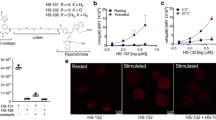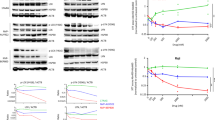Abstract
The anti-apoptotic function and tumor-associated expression of heat-shock protein 70 (HSP70) is consistent with HSP70 functioning as a survival factor to promote tumorigenesis. However, its immunomodulatory activities to induce anti-tumor immunity predict the suppression of tumor growth. Using the Hsp70.1/3−/−(Hsp70−/−) mouse model, we observed that tumor-derived HSP70 was neither required for cellular transformation nor for in vivo tumor growth. Hsp70−/− murine embryonic fibroblasts (MEFs) were transformed by E1A/Ras and generated tumors in immunodeficient hosts as efficiently as wild-type (WT) transformants. Comparison of Bcr-Abl-mediated transformation of WT and Hsp70−/− bone marrow and progression of B-cell leukemogenesis in vivo revealed no differences in disease onset or survival rates, and Eμ-Myc-driven lymphoma in Hsp70−/− mice was phenotypically indistinguishable from that in WT Eμ-Myc mice. However, Hsp70−/− E1A/Ras MEFs generated significantly larger tumors than their WT counterparts in C57BL/6 J immune-competent hosts. Concurrent with this was a reduction in intra-tumoral infiltration of innate and adaptive immune cells, including macrophages and CD8+ T cells. Evaluation of several potential mechanisms revealed an HSP70-chemokine-like activity to promote cellular migration. These observations support a role for tumor-derived HSP70 in facilitating anti-tumor immunity to limit tumor growth and highlight the potential consequences of anti-HSP70 therapy as an efficacious anti-cancer strategy.
This is a preview of subscription content, access via your institution
Access options
Subscribe to this journal
Receive 50 print issues and online access
$259.00 per year
only $5.18 per issue
Buy this article
- Purchase on Springer Link
- Instant access to full article PDF
Prices may be subject to local taxes which are calculated during checkout







Similar content being viewed by others
References
Ciocca DR, Arrigo AP, Calderwood SK . Heat shock proteins and heat shock factor 1 in carcinogenesis and tumor development: an update. Arch Toxicol 2013; 87: 19–48.
Min JN, Huang L, Zimonjic DB, Moskophidis D, Mivechi NF . Selective suppression of lymphomas by functional loss of Hsf1 in a p53-deficient mouse model for spontaneous tumors. Oncogene 2007; 26: 5086–5097.
Dai C, Whitesell L, Rogers AB, Lindquist S . Heat shock factor 1 is a powerful multifaceted modifier of carcinogenesis. Cell 2007; 130: 1005–1018.
Rohde M, Daugaard M, Jensen MH, Helin K, Nylandsted J, Jaattela M . Members of the heat-shock protein 70 family promote cancer cell growth by distinct mechanisms. Genes Dev 2005; 19: 570–582.
Binder RJ, Srivastava PK . Peptides chaperoned by heat-shock proteins are a necessary and sufficient source of antigen in the cross-priming of CD8+ T cells. Nat Immunol 2005; 6: 593–599.
Li Z, Menoret A, Srivastava P . Roles of heat-shock proteins in antigen presentation and cross-presentation. Curr Opin Immnunol 2002; 14: 45–51.
Srivastava P . Interaction of heat shock proteins with peptides and antigen presenting cells: chaperoning of the innate and adaptive immune responses. Annu Rev Immunol 2002; 20: 395–425.
Srivastava P . Roles of heat-shock proteins in innate and adaptive immunity. Nat Rev Immunol 2002; 2: 185–194.
Elsner L, Muppala V, Gehrmann M, Lozano J, Malzahn D, Bickeboller H et al. The heat shock protein HSP70 promotes mouse NK cell activity against tumors that express inducible NKG2D ligands. J Immunol 2007; 179: 5523–5533.
Gross C, Hansch D, Gastpar R, Multhoff G . Interaction of heat shock protein 70 peptide with NK cells involves the NK receptor CD94. Biol Chem 384: 267–279.
Chalmin F, Ladoire S, Mignot G, Vincent J, Bruchard M, Remy-Martin JP et al. Membrane-associated Hsp72 from tumor-derived exosomes mediates STAT3-dependent immunosuppressive function of mouse and human myeloid-derived suppressor cells. J Clin Invest 120: 457–471.
Asea A, Kraeft SK, Kurt-Jones EA, Stevenson MA, Chen LB, Finberg RW et al. HSP70 stimulates cytokine production through a CD14-dependant pathway, demonstrating its dual role as a chaperone and cytokine. Nat Med 6: 435–442.
Chen T, Guo J, Han C, Yang M, Cao X . Heat shock protein 70, released from heat-stressed tumor cells, initiates antitumor immunity by inducing tumor cell chemokine production and activating dendritic cells via TLR4 pathway. J Immunol 2009; 182: 1449–1459.
Mambula SS, Calderwood SK . Heat shock protein 70 is secreted from tumor cells by a nonclassical pathway involving lysosomal endosomes. J Immunol 2006; 177: 7849–7857.
Vega VL, Rodriguez-Silva M, Frey T, Gehrmann M, Diaz JC, Steinem C et al. Hsp70 translocates into the plasma membrane after stress and is released into the extracellular environment in a membrane-associated form that activates macrophages. J Immunol 180: 4299–4307.
Matzinger P . Tolerance, danger, and the extended family. Annu Rev Immunol 1994; 12: 991–1045.
Borges TJ, Wieten L, van Herwijnen MJ, Broere F, van der Zee R, Bonorino C et al. The anti-inflammatory mechanisms of Hsp70. Front Immunol 2012; 3: 95.
van Eden W, Spiering R, Broere F, van der Zee R . A case of mistaken identity: HSPs are no DAMPs but DAMPERs. Cell Stress Chaperones 2012; 17: 281–292.
Millar DG, Garza KM, Odermatt B, Elford AR, Ono N, Li Z et al. Hsp70 promotes antigen-presenting cell function and converts T-cell tolerance to autoimmunity in vivo. Nat Med 2003; 9: 1469–1476.
Kottke T, Pulido J, Thompson J, Sanchez-Perez L, Chong H, Calderwood SK et al. Antitumor immunity can be uncoupled from autoimmunity following heat shock protein 70-mediated inflammatory killing of normal pancreas. Cancer Res 2009; 69: 7767–7774.
Stocki P, Dickinson AM . The immunosuppressive activity of heat shock protein 70. Autoimmune Dis 2012; 2012: 617213.
Blachere NE, Li Z, Chandawarkar RY, Suto R, Jaikaria NS, Basu S et al. Heat shock protein-peptide complexes, reconstituted in vitro, elicit peptide-specific cytotoxic T lymphocyte response and tumor immunity. J Exp Med 1997; 186: 1315–1322.
Udono H, Srivastava PK . Heat shock protein 70-associated peptides elicit specific cancer immunity. J Exp Med 1993; 178: 1391–1396.
Hunt CR, Dix DJ, Sharma GG, Pandita RK, Gupta A, Funk M et al. Genomic instability and enhanced radiosensitivity in Hsp70.1- and Hsp70.3-deficient mice. Mol Cell Biol 2004; 24: 899–911.
Williams RT, Roussel MF, Sherr CJ . Arf gene loss enhances oncogenicity and limits imatinib response in mouse models of Bcr-Abl-induced acute lymphoblastic leukemia. Proc Natl Acad Sci USA 2006; 103: 6688–6693.
Adams JM, Harris AW, Pinkert CA, Corcoran LM, Alexander WS, Cory S et al. The c-myc oncogene driven by immunoglobulin enhancers induces lymphoid malignancy in transgenic mice. Nature 1985; 318: 533–538.
Leu JI, Pimkina J, Frank A, Murphy ME, George DL . A small molecule inhibitor of inducible heat shock protein 70. Mol Cell 2009; 36: 15–27.
Nylandsted J, Rohde M, Brand K, Bastholm L, Elling F, Jaattela M . Selective depletion of heat shock protein 70 (Hsp70) activates a tumor-specific death program that is independent of caspases and bypasses Bcl-2. Proc Natl Acad Sci USA 2000; 97: 7871–7876.
van Herwijnen MJ, Wieten L, van der Zee R, van Kooten PJ, Wagenaar-Hilbers JP, Hoek A et al. Regulatory T cells that recognize a ubiquitous stress-inducible self-antigen are long-lived suppressors of autoimmune arthritis. Proc Natl Acad Sci USA 2012; 109: 14134–14139.
Wachstein J, Tischer S, Figueiredo C, Limbourg A, Falk C, Immenschuh S et al. HSP70 enhances immunosuppressive function of CD4(+)CD25(+)FoxP3(+) T regulatory cells and cytotoxicity in CD4(+)CD25(-) T cells. PLoS One 2012; 7: e51747.
Multhoff G . Activation of natural killer cells by heat shock protein 70. Int J Hyperthermia 18: 576–585.
Stocki P, Wang XN, Dickinson AM . Inducible heat shock protein 70 reduces T cell responses and stimulatory capacity of monocyte-derived dendritic cells. J Biol Chem 287: 12387–12394.
Dunn GP, Old LJ, Schreiber RD . The three Es of cancer immunoediting. Annu Rev Immunol. Annu Rev Immunol 2004; 22: 329–360.
DuPage M, Mazumdar C, Schmidt LM, Cheung AF, Jacks T . Expression of tumour-specific antigens underlies cancer immunoediting. Nature 482: 405–409.
Effendi K, Sakamoto M . Molecular pathology in early hepatocarcinogenesis. Oncology 2010; 78: 157–160.
Malusecka E, Krzyzowska-Gruca S, Gawrychowski J, Fiszer-Kierzkowska A, Kolosza Z, Krawczyk Z . Stress proteins HSP27 and HSP70i predict survival in non-small cell lung carcinoma. Anticancer Res 2008; 28: 501–506.
Torronteguy C, Frasson A, Zerwes F, Winnikov E, da Silva VD, Menoret A et al. Inducible heat shock protein 70 expression as a potential predictive marker of metastasis in breast tumors. Cell Stress Chaperones 2006; 11: 34–43.
Zietara N, Lyszkiewicz M, Gekara N, Puchalka J, Dos Santos VA, Hunt CR et al. Absence of IFN-beta impairs antigen presentation capacity of splenic dendritic cells via down-regulation of heat shock protein 70. J Immunol 2009; 183: 1099–1109.
Mignot G, Chalmin F, Ladoire S, Rebe C, Ghiringhelli F . Tumor exosome-mediated MDSC activation. Am J Pathol 2011; 178: 1403–1404, author reply 4-5.
Acknowledgements
We thank Dr Douglas Green for discussion during the preparation of this manuscript and Eleanora Puetz and Alex Yu for genotyping. Special thanks to the husbandry staff of the Animal Resource Center and to the Animal Imaging Center, including Christopher Calabrese, Melissa Johnson and Monique Payton. We are grateful to the flow cytometry facility for their assistance in FACS and flow analysis. This work was funded in part by core funding and Cancer Center Supporting Grant (CCSG) developmental funds (5P30CA021765–29) (to HMB) and the American Lebanese-Syrian Associated Charities of St Jude Children’s Research Hospital.
Author information
Authors and Affiliations
Corresponding author
Ethics declarations
Competing interests
The authors declare no conflict of interest.
Additional information
Supplementary Information accompanies this paper on the Oncogene website
Supplementary information
Rights and permissions
About this article
Cite this article
Dodd, K., Nance, S., Quezada, M. et al. Tumor-derived inducible heat-shock protein 70 (HSP70) is an essential component of anti-tumor immunity. Oncogene 34, 1312–1322 (2015). https://doi.org/10.1038/onc.2014.63
Received:
Revised:
Accepted:
Published:
Issue Date:
DOI: https://doi.org/10.1038/onc.2014.63
This article is cited by
-
Shikonin improves the effectiveness of PD-1 blockade in colorectal cancer by enhancing immunogenicity via Hsp70 upregulation
Molecular Biology Reports (2024)
-
Hsp70 in cancer: back to the future
Oncogene (2015)



